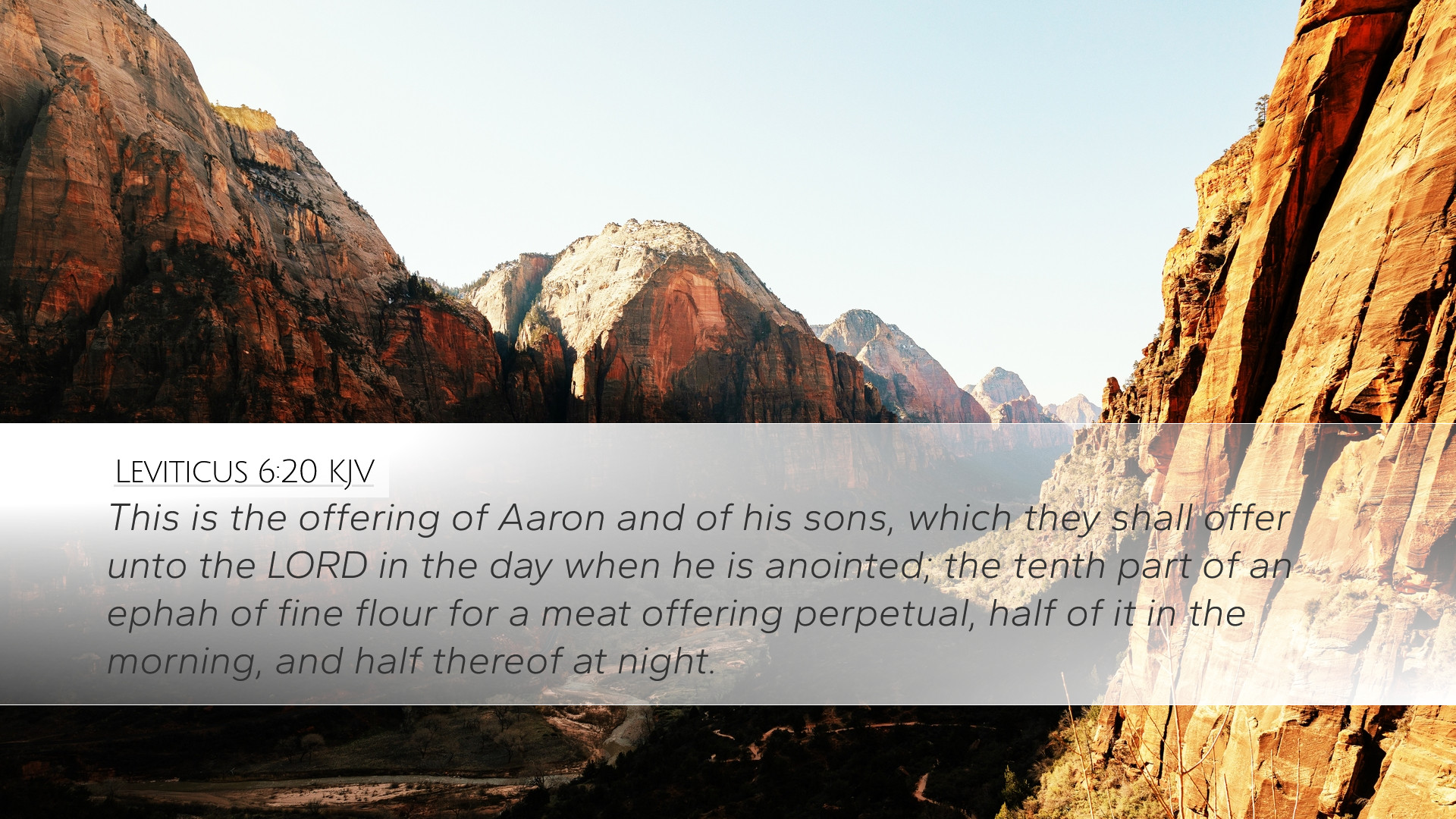Commentary on Leviticus 6:20
Verse Text: “This is the offering of Aaron and of his sons, which they shall offer unto the Lord in the day when he is anointed: the tenth part of an ephah of fine flour for a meat offering perpetual, half of it in the morning, and half thereof at night.” (Leviticus 6:20 KJV)
Introduction to Leviticus 6:20
The Book of Leviticus serves as a manual for the priests and the people of Israel regarding worship and holiness. Chapter 6 specifically addresses the priestly duties and the necessary offerings for atonement and consecration. Leviticus 6:20 provides detailed instructions about the offerings that Aaron and his sons are to make as part of their initiation into the priesthood. Public domain commentaries offer valuable insights into the meaning and implications of this verse.
Matthew Henry’s Commentary
Matthew Henry expounds on the significance of the offerings prescribed for Aaron and his sons. He emphasizes that the offerings are not merely ceremonial rites but a means of devoting oneself and one’s family to the ministry of God. The tenth part of an ephah of fine flour signifies the acknowledgment of God’s provision and the necessity of giving back to Him as a fundamental principle of spiritual life.
- Consecration: This offering marks a vital step in the consecration process of the priests. It represents their full dedication to God’s service.
- Daily Offering: The division of the offering into morning and evening demonstrates the importance of consistent worship and reliance on God throughout every part of the day.
- Culinary Symbolism: Fine flour, as a representation of purity and quality, indicates the kind of spirit one must bring to God—pure and unblemished.
Albert Barnes’ Commentary
Albert Barnes draws attention to the specific instructions for how the offerings are to be presented. He highlights the role of the priests in bridging the gap between the holy God and unholy people. The fact that offerings are to be made at the time of their anointing signifies that the anointing itself is an essential aspect of their qualification for serving God’s people.
- Anointing and Authority: The act of anointing is symbolic of God’s selection and empowerment. Thus, the offering acts as an initial public declaration of their sacred role.
- Symbol of Dependence: The continuous offering of fine flour is not merely practical; it is a reminder of the priests’ total dependence on God for sustenance and strength.
- Significance of Timing: The instruction to divide the offering emphasizes the need for regular communion with God, highlighting the importance of both corporate worship and personal devotion.
Adam Clarke’s Commentary
Adam Clarke’s interpretation delves into the implications of the offerings for the community of Israel. He posits that these offerings also teach the nation about the character of God, who desires not just ritual compliance but relational devotion from His people. Clarke outlines how the offerings reflect the communal aspect of worship.
- Community Aspect: The offerings serve as a reminder that the priests act on behalf of the people, representing them in worship and intercession.
- Type of Christ: The offering points forward to the ultimate sacrifice of Christ, establishing a typology where He becomes the perfect offering once for all.
- Purpose and Intent: The intent behind the offering matters as much as the act itself. It must come from a heart of gratitude and recognition of God’s holiness.
Theological Implications
Leviticus 6:20 provides rich theological insights regarding the nature of God’s covenanted relationship with His people. The obligations of the priests underscore essential doctrines such as:
- Holiness: The emphasis on purity and the quality of offerings reflects God’s nature and His call for His people to emulate His holiness.
- Intercession: The priest’s role as mediators points to the essential need for intercessors between God and man and is fulfilled perfectly in Christ.
- Daily Devotion: Regular offerings signify that one’s relationship with God is not limited to special occasions but should permeate daily life.
Application for Today
For modern believers, Leviticus 6:20 serves as a unique reminder of several practical applications:
- Sacrificial Living: Christians are called to live sacrificially, modeling their lives after the priestly functions while trusting in Christ’s ultimate sacrifice.
- Ongoing Worship: The morning and evening offerings encourage a lifestyle of continual worship, emphasizing the need for a pro-active faith rather than a reactive one.
- Community and Leadership: Church leaders are encouraged to be mindful of their roles, acting in service to their communities and maintaining their spiritual integrity through regular offerings of worship and service.
Conclusion
Leviticus 6:20 serves as a robust directive for the priests of Israel, weaving together themes of dedication, holiness, and community worship. Through insights gathered from Matthew Henry, Albert Barnes, and Adam Clarke, it becomes evident that this passage holds timeless truths applicable to today’s context. Believers are called not only to offer their lives in service to God but also to understand the underlying principles of worship, intercession, and daily devotion that arise from such sacrificial acts.


